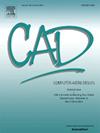文本驱动的三维人体运动生成的姿态估计使用双变压器架构
IF 3.1
3区 计算机科学
Q2 COMPUTER SCIENCE, SOFTWARE ENGINEERING
引用次数: 0
摘要
近年来,文本到动作生成技术取得了重大进展。然而,现有的方法很难产生高质量的3D人体运动,有效地捕捉姿势估计。这些限制是由于弱姿态估计和有限的骨骼建模。为了解决这些限制,我们提出了DT3DPE(用于3D姿态估计的双变压器),这是一个集成姿态估计以生成文本对齐的逼真的3D人体运动的框架。该方法引入残差矢量量化和附加层来编码姿态标记,从而能够捕获身体动力学中的细粒度细节。此外,DT3DPE采用双变压器架构,包括用于运动令牌预测的屏蔽变压器和用于细化运动细节的残余变压器。这种双变压器结构使模型能够生成高保真的3D人体姿势,具有精确的身体关节定位和平滑的时间过渡。在HumanML3D和KIT-ML数据集上的实验结果表明,DT3DPE在文本驱动的3D人体运动生成方面优于现有的最先进方法。我们的代码可在https://github.com/swerizwan/DT3DPE上获得。本文章由计算机程序翻译,如有差异,请以英文原文为准。
Text-driven 3D human motion generation for pose estimation using dual-transformer architecture
Text-to-motion generation has made significant progress in recent years. However, existing approaches struggle to generate high-quality 3D human motions that effectively capture pose estimation. These limitations are due to weak pose estimation and limited skeletal modeling. To address these limitations, we propose DT3DPE (Dual-Transformer for 3D Pose Estimation), a framework that integrates pose estimation to generate text-aligned, realistic 3D human motions. The proposed approach introduces residual vector quantization with additional layers for encoding pose tokens, enabling the capture of fine-grained details in body dynamics. Furthermore, DT3DPE employs a dual-transformer architecture, consisting of a masked transformer for motion token prediction and a residual transformer for refining motion details. This dual-transformer architecture allows the model to generate high-fidelity 3D human poses with precise body joint positioning and smooth temporal transitions. The experimental results on HumanML3D and KIT-ML datasets demonstrate that DT3DPE outperforms existing state-of-the-art methods in text-driven 3D human motion generation. Our code is available at https://github.com/swerizwan/DT3DPE.
求助全文
通过发布文献求助,成功后即可免费获取论文全文。
去求助
来源期刊

Computer-Aided Design
工程技术-计算机:软件工程
CiteScore
5.50
自引率
4.70%
发文量
117
审稿时长
4.2 months
期刊介绍:
Computer-Aided Design is a leading international journal that provides academia and industry with key papers on research and developments in the application of computers to design.
Computer-Aided Design invites papers reporting new research, as well as novel or particularly significant applications, within a wide range of topics, spanning all stages of design process from concept creation to manufacture and beyond.
 求助内容:
求助内容: 应助结果提醒方式:
应助结果提醒方式:


